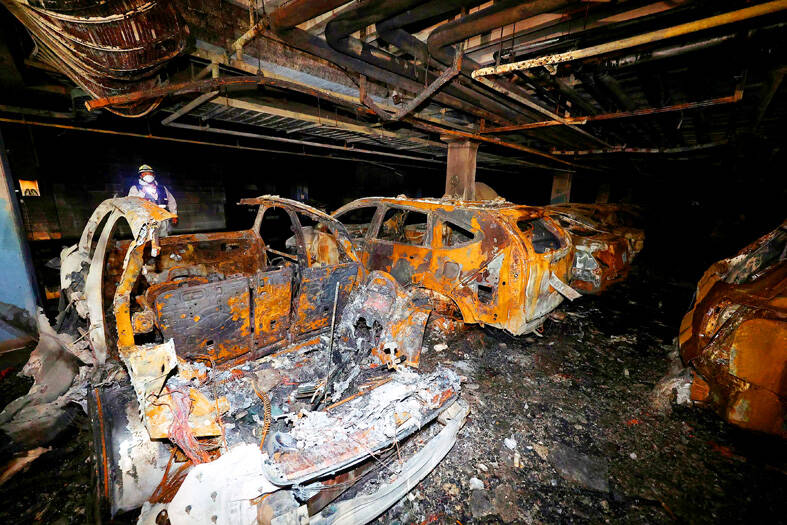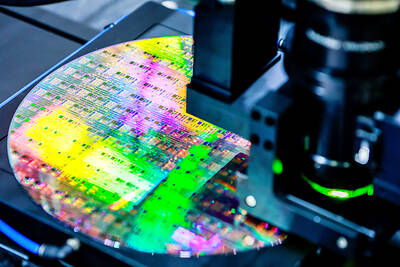South Korea’s government and the ruling People Power Party (PPP) have agreed to move up an electric vehicle (EV) battery certification program, the party said on Sunday, as authorities seek to alleviate public safety concerns after a series of fires involving EVs.
The government would start the battery certification scheme in October, earlier than scheduled, to help guarantee the safety of EV batteries, PPP spokesman Han Zee-a said.
The government also agreed to require automakers operating in the country to identify batteries used in their EVs, he said.

Photo: Reuters
The agreement on tougher rules for EV safety follows the government’s move to urge car makers to voluntarily disclose the information after an EV fire on Aug. 1 that damaged hundreds of vehicles and created public panic.
The blaze, which appeared to start spontaneously in a Mercedes-Benz EV with Farasis Energy Inc batteries in the city of Incheon, took eight hours to extinguish, destroying or damaging about 140 cars and forcing some residents in the apartments above to move to shelters.
Officials said the fire was made worse because equipment such as sprinklers in the underground parking lot did not work properly.
Early this month, Kia Corp’s electric crossover EV6 with South Korean battery maker SK On Co’s batteries also caught fire in a parking lot, fire authorities said.
In recent days, some car companies such as Hyundai Motor Co, Mercedes-Benz Korea, Kia Corp and Volkswagen Korea, have voluntarily started naming the manufacturers of batteries they use.
South Korean battery makers had no reason to oppose specifying where their power sources were used, although the public should not assume batteries were always to blame for EV fires, industry sources said.
Getting car companies to identify batteries would give consumers more choice, but some question how it would improve safety given the lack of definitive data on which battery brands are more prone to fires, experts said.
As part of beefed-up safety measures, the government would revise fire equipment rules to install wet pipe sprinkler systems in underground parking spaces with EV charging stations and expand chargers that prevent overcharging, Han said.
EVs do not appear to catch fire nearly as much as recent headlines might suggest, and are less of a fire risk than conventional cars, data showed.
However, EV fires burn differently than those in cars with internal combustion engines, often lasting longer and being harder to extinguish as they have a tendency to reignite, auto experts said.

TECH TITAN: Pandemic-era demand for semiconductors turbocharged the nation’s GDP per capita to surpass South Korea’s, but it still remains half that of Singapore Taiwan is set to surpass South Korea this year in terms of wealth for the first time in more than two decades, marking a shift in Asia’s economic ranks made possible by the ascent of Taiwan Semiconductor Manufacturing Co (TSMC, 台積電). According to the latest forecasts released on Thursday by the central bank, Taiwan’s GDP is expected to expand 4.55 percent this year, a further upward revision from the 4.45 percent estimate made by the statistics bureau last month. The growth trajectory puts Taiwan on track to exceed South Korea’s GDP per capita — a key measure of living standards — a

Samsung Electronics Co shares jumped 4.47 percent yesterday after reports it has won approval from Nvidia Corp for the use of advanced high-bandwidth memory (HBM) chips, which marks a breakthrough for the South Korean technology leader. The stock closed at 83,500 won in Seoul, the highest since July 31 last year. Yesterday’s gain comes after local media, including the Korea Economic Daily, reported that Samsung’s 12-layer HBM3E product recently passed Nvidia’s qualification tests. That clears the components for use in the artificial intelligence (AI) accelerators essential to the training of AI models from ChatGPT to DeepSeek (深度求索), and finally allows Samsung

Taiwan has imposed restrictions on the export of chips to South Africa over national security concerns, taking the unusual step of using its dominance of chip markets to pressure a country that is closely allied with China. Taiwan requires preapproval for the bulk of chips sold to the African nation, the International Trade Administration said in a statement. The decision emerged after Pretoria tried to downgrade Taipei’s representative office and force its move to Johannesburg from Pretoria, the Ministry of Foreign Affairs has said. The move reflects Taiwan’s economic clout and a growing frustration with getting sidelined by Beijing in the diplomatic community. Taiwan

READY TO HELP: Should TSMC require assistance, the government would fully cooperate in helping to speed up the establishment of the Chiayi plant, an official said Taiwan Semiconductor Manufacturing Co (TSMC, 台積電) yesterday said its investment plans in Taiwan are “unchanged” amid speculation that the chipmaker might have suspended construction work on its second chip packaging plant in Chiayi County and plans to move equipment arranged for the plant to the US. The Chinese-language Economic Daily News reported earlier yesterday that TSMC had halted the construction of the chip packaging plant, which was scheduled to be completed next year and begin mass production in 2028. TSMC did not directly address whether construction of the plant had halted, but said its investment plans in Taiwan remain “unchanged.” The chipmaker started